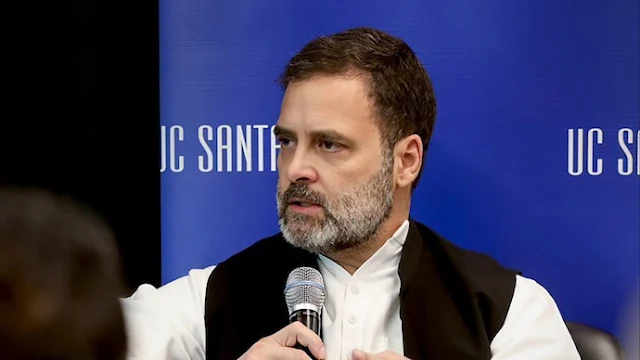During a recent visit to the United States, Rahul Gandhi engaged in various discussions with audiences, one of which included an interaction with a Sikh individual present. In this conversation, he referenced the polarized political landscape in India, emphasizing the increasing assertiveness of sectarian politics.
Gandhi articulated a fundamental concern: “The struggle is over whether he, as a Sikh, can wear his turban in India, whether he can don a ‘kada,’ or whether he will have the freedom to visit a gurdwara. This is not just his battle; it is a fight for all religious communities,” he stated.
This example regarding Sikhs appears to be a specific illustration of a broader pattern of intimidation faced by religious minorities in India. However, this drew sharp criticism from Sikh and BJP leaders, who labeled Gandhi with accusations of divisiveness and “anti-national” sentiment.
Their responses seemed to overlook the essential issue of protecting the religious and cultural rights of diverse societal groups and were instead utilized as a means to further attack Gandhi, who has repeatedly faced vitriolic criticism from the BJP.
In a subsequent tweet, Gandhi reaffirmed his vision for India, stating, “As usual, the BJP is resorting to lies. They are desperate to silence me because they cannot stand the truth. I will continue to advocate for the values that define India: our unity in diversity, equality, and love.”
In an article in the Indian Express, Cabinet Minister Hardeep Singh Puri claimed that the Sikh community only faced significant crises during the 1980s, notably referencing the ethnic cleansing of Sikhs, particularly during the 1984 riots in Delhi. He analogized Gandhi’s stance to that of Muhammad Ali Jinnah, accusing him of attempting to divide the nation.
Puri’s comments disregarded the BJP government’s neglect of farmers' demands, many of whom were Sikhs, leading up to the withdrawal of controversial agricultural laws. Additionally, protestors were often labeled as “Khalistanis.”
Regarding the 1984 ethnic cleansing, it is crucial to remember that those responsible for the violence must be held accountable. Former Prime Minister Manmohan Singh of the Indian National Congress has issued an apology for these events, and it is expected that justice will be pursued for the victims of these atrocities. The decades-long delay in prosecuting those responsible for the crimes of 1984 is highly reprehensible.
It is important to note that the RSS-BJP did not emerge as defenders of the Sikh community during its time of suffering. In fact, as Shamsul Islam, a prominent scholar on the rise of fundamentalism in India, points out, the RSS was complicit in the atrocities committed during that dark period. Islam references a document titled “Moments of Soul Searching,” circulated by Nana Deshmukh, an influential RSS ideologue, shortly after the riots.
This document serves as a key piece of evidence reflecting the ideological justification for the massacre of Sikhs in 1984. Gandhi’s comments have also drawn different reactions from Sikh groups, with some perceiving his remarks as a validation of their identity.
K. Sudarshan, a former RSS chief, controversially asserted that Sikhism is a sect of Hinduism, which sparked significant backlash. In 2019 Mohan Bhawat said that India is a Hindu Nation. There was a strong protest against both these statements. These outpourings also show the RSS mindset.
Such statements reinforce the RSS’s narrow perspective; Sikhism is recognized as an independent faith with its founder, Guru Nanak Devji, who famously proclaimed, “Na Hum Hindu Na Hum Musalmman” (I am neither a Hindu nor a Muslim).
Editorials in several prominent Punjabi newspapers, including the Punjabi Tribune and Nawa Zamana, have criticized the RSS assertion. The Shiromani Gurudwara Prabandhak Committee (SGPC) and the Shiromani Akali Dal (SAD), both part of the NDA alliance, also voiced strong objections. Giani Harpreet Singh, the acting Jathedar of Akal Takht, remarked that RSS statements risk fostering divisions within the country and are contrary to national interests.
Contrary to the claims that Sikhism is merely an extension of Hinduism, the foundational text “Hum Hindu Nahin” (We are Not Hindus) by Kahan Singh asserts Sikhism’s independence. The rich tapestry of Sikh tradition includes a syncretism that honors both Sufi and Bhakti saints, promoting values of equality and rejecting the rigid hierarchies often associated with caste and gender imposed by orthodox traditions.
Interestingly, Sikhism, along with Buddhism and Jainism—religions emerging from the Indian subcontinent—advocates for the equality of all individuals, standing in opposition to caste and gender-based discrimination.
While some Sikh politicians may align with the BJP for power, they appear to overlook the fundamental conflict between Sikh values and the conservative ideologies of Brahminism. This is a sentiment echoed by B.R. Ambedkar, who renounced Hinduism in favor of Buddhism to escape its caste-based inequalities.
The response from Sikh organizations indicates a reclaiming of their identity amidst attempts to marginalize them. The BJP and RSS now appear to recognize Sikhism as a distinct religion, illustrating the complex dynamics at play.
Gandhi’s comments can be interpreted not as divisive but as a reaffirmation of the values enshrined in the Indian Constitution.
---
*Political commentator. A version of this article was first published in The Wire



Comments